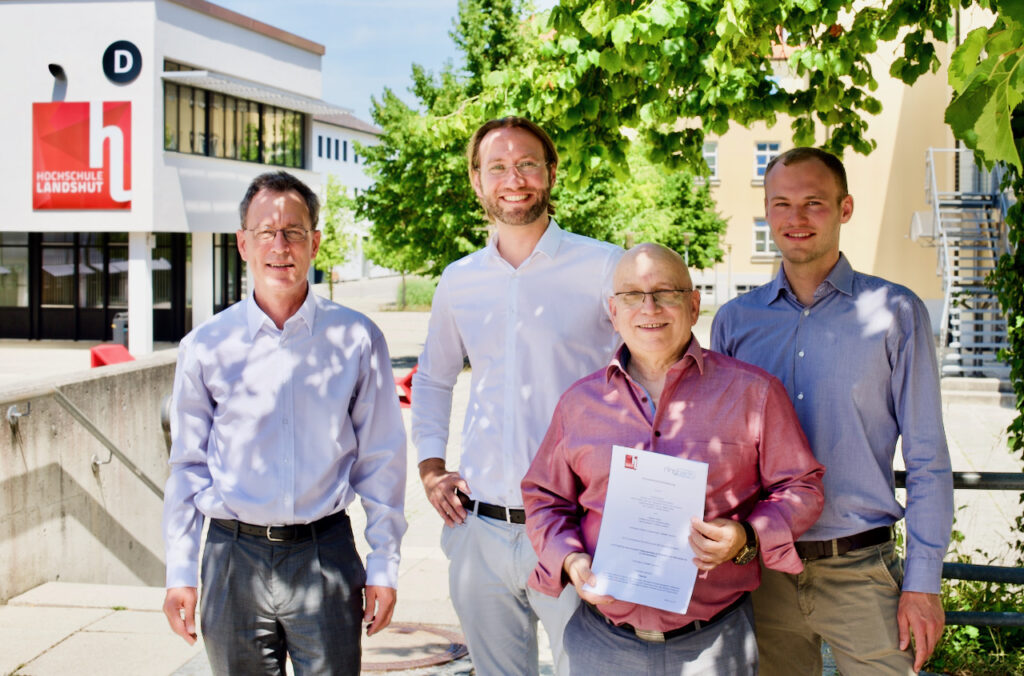
ringbach launches research project with Landshut University of Applied Sciences
- No Comments
Initial situation and project start
Since the beginning of the COVID 19 pandemic, respiratory protection masks have become an integral part of our daily lives. In the past two years, the demand for FFP2 masks has increased significantly. The main beneficiaries of this are Far Eastern manufacturers, who have a monopoly position in mask production on the world market and usually win public tenders due to their low labor costs. This is where a new project of the Landshut University of Applied Sciences and ringbach comes in. Together, we are developing a new type of plant for the production of high-quality FFP2 and FFP3 masks in Germany. It should enable local manufacturers to produce more economically and more independently. At the same time, we are looking at nonwoven production itself in order to realize an even better filter effect of the end product. The project is scheduled to run from July 2022 to June 2024 and is being funded by the German Federal Ministry for Economic Affairs and Climate Protection as part of the Central Innovation Program for SMEs (ZIM) program with a total of just under 400,000 euros.
Innovative plant concept
“Recent years have shown us how dependent Germany is on Far Eastern manufacturers – both for products and raw materials,” explains Prof. Dr. Walter Fischer, who is providing scientific support for the project at Landshut University of Applied Sciences. The new production concept is now set to change that. Because the special feature of the new production plant is the on-site production of a filter fleece, which is further processed and packaged directly and without interruption into mouth-nose protection masks – in a single production line. ringbach has already been granted a patent for this production process.
Whereas up to now manufacturers have had to purchase, store and cut the nonwoven from large-scale producers before processing it further, the planned line eliminates the complex logistics, dependence on nonwoven manufacturers and the complex processing steps. In addition, it is planned to monitor the production process through optical control based on machine learning.
Better filter effect
In addition, the project team plans to optimize the material itself. “The filter fleece is usually created by the so-called meltblown process,” says Fischer, “in which the plastic polypropylene is melted and then pressed through hundreds of tiny holes surrounded by air. This creates wafer-thin fibers that swirl in the air stream and form a very fine fiber pile. When cooled, the filaments, or textile fibers, finally coalesce and solidify into a nonwoven.” The goal now is to reduce the diameter of the filaments. After all, the finer these strands are manufactured, the better the filtering effect. This would also improve wearer comfort and make it easier to breathe.
While ringbach is responsible for the industrial implementation of the system in the project, Landshut University of Applied Sciences is providing support with its expertise in plastics technology. “We are interested in developing compounds, i.e. new composite materials that acquire certain properties through the addition of additives and can thus be better processed in the meltblown process,” explains Fischer.
Strengthening the competitiveness of local manufacturers
Managing Director Benedikt Häring came up with the idea for this new type of manufacturing plant when he was unable to visit his newborn daughter and wife in the hospital at the beginning of the Corona pandemic due to regulatory restrictions and a lack of protective masks. “With the planned plant concept, we want to enable local mask producers to produce more cheaply and sustainably in the future and thus strengthen their competitiveness,” affirms Häring and is pleased about the cooperation with Landshut University of Applied Sciences: “It is important for science and industry to work together on innovations and complement their expertise. This is always a benefit for the region.”
Photo: Landshut University of Applied Sciences


